News from the SW Chapter

FLMS Spring Workshop
Thursday, May 30, 2024 ~ 10:00am – 3:00pm
Florida Citrus Building
500 3rd Street
Winter Haven, Florida
R.S.V.P. by May 25th! Sorry, this workshop is now full!
Sponsored by
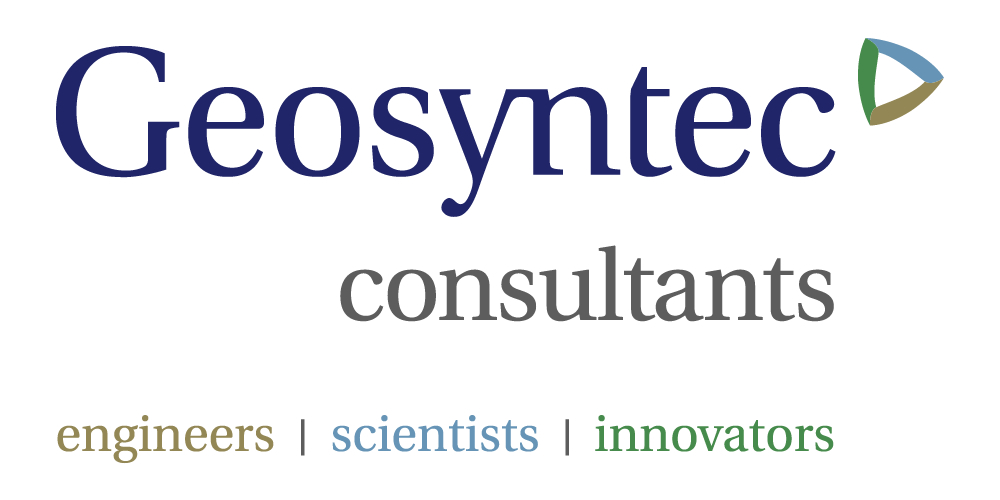
Hosted by

Agenda
Last updated 5/29/24.
10:00 AM – Welcome and Introductions
10:15 AM – Presentations
Water Quality Improvement Projects in an Urban Watershed – Jessica Schilling, City of Lakeland
Making a Rain Garden Town – Devon Moore, City of Winter Haven
Upper Peace Creek Lakes Multivariate Analysis and Model Visualization using A R Shiny Web Application – Dan Schmutz and Carlos Moros, Greenman-Pedersen, Inc.
Restoration Techniques to Address Internal Nutrient Loading from Sediments – Patrick Goodwin, Naturalake Biosciences
12:30 PM – Lunch (Provided)
1:00 PM – Presentations
Aeration and Habitat Enhancement: Benefits to Crescent Lake, St. Petersburg – James Bays, Save Our Urban Lakes
PFAS (Per- and Polyfluorinated Substances) – Olivia Husik, City of Winter Haven
Exposing Sewage Pollution with Microbial Source Tracking – Kevin Tyre, Geosyntec Consultants
Enhanced Nutrient Reducing Onsite Systems – Roxanne Groover, Florida Onsite Wastewater Association
3:15 PM – Workshop Close
This meeting is FREE to current members and $20 for non-members but includes lunch and a 2024 FLMS membership. R.S.V.P. by May 25th please!
PAST SW CHAPTER WORKSHOPS
FLMS Spring Workshop
Thursday, April 27, 2023 ~ 10:30am – 3:30pm
Brooker Creek Preserve Environmental Education Center
3940 Keystone Road
Tarpon Springs, FL 34688
Sponsored by

Agenda
10:30 AM-10:50 AM Welcome and Introductions
10:50-11:25 AM Jungle Lake Restoration Plan, Pinellas County, Florida-Jim Bays, Stewards of Our Urban Lakes (SoUL) Inc.
Jungle Lake is a 10-acre artificial stormwater management pond within Walter Fuller Park in St. Petersburg, Florida, conveying runoff to Boca Ciega Bay. Converted from an open retention pond to a flow-through wetland pond in the mid-1990s, Jungle Lake treatment performance is less than expected in comparison to similar stormwater Best Management Practices (BMPs). Stewards of Our Urban Lakes, in partnership with the Jungle Terrace Civic Association, the City of St. Petersburg, and Keep Pinellas Beautiful, is embarking on a multi-year, volunteer-based project to improve performance by restoring and expanding coverage by emergent, floating-leaved, and submersed aquatic vegetation
11:25-12:00 PM FWC Freshwater Fisheries Division Southwest Region Overview – Florida Fish and Wildlife Conservation Commission Division of Freshwater Fisheries Management Staff
Florida Fish and Wildlife Conservation Commission’s (FWC) Freshwater Fisheries Division provides expertise on freshwater fish populations, angler use, or other aspects of freshwater fisheries needed for management decisions by the FWC. The Division assess impacts of decisions made by others to ensure quality fisheries and fishing in selected Florida lakes, fish management areas, rivers and streams. The Division also delivers aquatic education and outreach to future anglers to expose them to angler ethics, fisheries management, aquatic ecology, tackle crafting, angling skills, fish identification and other aspects aimed at promoting responsible life-long participation in sport fishing. This presentation will provide an overview of the Division’s work and provide a few examples of projects from the region.
12:00-12:45 PM Lunch and Sponsor Remarks
12:45-1:20 PM Accelerated Water Restoration Approaches in Florida– Pamela J Dugan, Ph.D., EutroPHIX
Water resources across the globe are under severe pressure due to increasing anthropogenic impacts caused by excess nutrient loading, in particular phosphorus. Lakes and streams that were once oligotrophic and healthy are rapidly becoming highly eutrophic with recurring harmful algal blooms. There is significant demand for accelerated lake restoration and the development of operationally and technically efficient technologies for sustainable water resource management. This presentation will provide an overview of new water resource management options for accelerated restoration of impaired water bodies.
1:20-1:55 PM Lake Seminole Restoration Efforts–Rob Burnes, Pinellas County Environmental Management
Lake Seminole, located in Central Pinellas County, experienced several decades of water quality and habitat decline leading Pinellas County and the Florida Department of Environmental Protection to develop a Reasonable Assurance Plan (RAP) to act as a road map for restoring the lake. Work began in the early 2000’s and is still ongoing today. To date, Pinellas County has completed nearly two dozen projects aimed to improve water quality and restore aquatic and wetland habitats. This presentation will discuss the restoration efforts and their outcomes with regards to health of the lake.
1:55-2:10 PM Break
2:10-2:45 PM Florida Fish and Wildlife Conservation Commission Invasive Plant Management (IPM): What We Do and Why We Do it–Charlie Thompson, Florida Fish and Wildlife Conservation Commision Invasive Plant Management Section
Florida Fish and Wildlife’s (FWC) Invasive Plant Management Section (IPM) is the lead agency in Florida responsible for coordinating and funding statewide programs to control invasive aquatic and upland plants on waterways and public conservation lands throughout the state. The section also ensures that beneficial native aquatic plants in Florida’s ponds, lakes and rivers are protected through its permitting programs and funding research to find more cost-effective management techniques. This presentation will provide an overview of IPM section’s work and provide a few examples of projects from the region.
2:45-3:00 PM FLMS Updates and End of Workshop
FLMS SW Chapter Workshop Summary
Monday, April 15, 2019
Brooker Creek Preserve Environmental Education Center
Sponsored by

Hosted by


Agenda
11:00 AM-11:15 AM Welcome and Introductions – Rob Burnes, FLMS President
11:15-11:45 AM What is Se7en Wetlands –Julie Vogel, City of Lakeland
Se7en Wetlands is a 1,600+ acre constructed treatment wetland that receives all the City of Lakeland’s treated wastewater before connecting downstream to the Alafia River. Even though it’s called Se7en ‘Wetlands’, there is a combination of marsh, uplands, and open water lakes. This is due to the property once being used for phosphate mining and clay settling.
11:45-12:15 PM Old Tampa Bay Water Quality Improvement Project-Gary Serviss, VHB, Inc.
The Old Tampa Bay Water Quality Improvement Project (OTBWQIP) consists of constructing a 229-foot bridge opening in the Courtney Campbell Causeway to increase water circulation in the far eastern portion of Old Tampa Bay. The project will partially reestablish the hydrologic integrity, significantly restore the historical flow patterns, and ameliorate water quality impacts associated with the artificial impediment to water circulation in this portion of Old Tampa Bay. These hydrologic improvements are anticipated to improve water quality conditions sufficiently such that approximately 320 acres of seagrass meadows would be enhanced.
12:15-12:45 PM Lunch Sponsored by Applied Polymer Systems
12:45-1:15 PM Using an Array of Paleolimnological and Hydrological Variables to Develop Site-Specific Alternative Criteria (SSAC) for Lake Tarpon–Megan Long – Wood Environmental
This presentation will look at how historical human alterations and hydrological data coupled with paleolimnological data were used to develop SSACs for Lake Tarpon. .
1:15-1:45 PM Measuring Sediment Flux and Internal Loads to Inform Management Decisions-Erik Oij, Wood Environmental
Bench scale derived sediment nutrient flux rates and loads were used to conduct treatment alternatives analyses for several lakes. In addition, cost-effective options were proposed to tailor lake management planning when whole-scale dredging projects were not cost-effective
1:45-2:15 PM How to Determine when Alternative to TMDL Restoration Pathways Should be Used, and Methods to Obtain Water Quality Credits Using Innovative BMPs-Mary Szafraniec, Wood Environmental
Several alternatives to TMDLs (e.g. SSACs, NRPs, RAPs, stream exclusions) and when they should be used to address water quality restoration will be discussed. In addition, ongoing efforts on developing water quality credit systems for sediment management BMPs (sediment inactivation and removal) and stream restoration will also be discussed.
2:15-2:30 PM Break
2:30-3:00 PM Lake Minimum Level (MFL) Establishment in the Southwest Florida Water Management District
– Donna Campbell & Mark Hurst, Southwest Florida WaterMgmt District
This presentation will provide a brief background on the process for the establishment of Minimum and Guidance Levels for lakes within the Southwest Florida Water Management District, as outlined in Rule 40D-8.624, F.A.C. We will also provide an example of how the Minimum and Guidance Levels were determined for a lake that we recently evaluated.
3:00-3:30 PM LVI in Pinellas County-Peggy Morgan, Pinellas County
The Lake Vegetation Index bio-assessment procedure was established by FDEP in 2011. This procedure measures the degree to which a freshwater lake supports a healthy, well-balanced plant community. Pinellas County has been monitoring County lakes since the inception of the program and this presentation will review explore the results see thus far.
3:30-4:00 PM Impacts of Erosion and Sediment on Communities-Eddie Snell, Applied Polymer Systems, Inc.
This short presentation will show how human activities can accelerate the erosion and sedimentation process. These can impact ecosystems, infrastructure, health, quality of life, and property values. Solutions include stormwater training and education, citizen watch groups, community support for lakes and wetlands, and the political will to enforce existing regulations governing erosion and sedimentation.
4:00-4:30 PM FLMS Updates & Roundtable Discussion, Workshop Close
*****************************************************
SW Chapter hosts Citizens Stormwater Pond Education Workshop
Tuesday, November 14, 2017 ~ 9am to 3pm
Location: Lee County Mosquito/Hyacinth Control District
15191 Homestead Road, Lehigh Acres, FL 33971
Pond Problems?
A forum to discuss storm water ponds management
Real local cases of management practices
Learn how to save money and have healthy storm water ponds
Specifically for homeowner associations (HOAs), condo associations, community association managers (CAMs) and residents
This workshop is FREE! Lunch is included with pre-registration.
To register or exhibit contact Ernesto Lasso de la Vega 239-694-2171 or visit www.wetplan.org
This event is hosted by Lee County Hyacinth Control District, Florida Lake Management Society, Charlotte Harbor National Estuary Program and WETPLAN.org
***********************************************************************************************************
Summary of FLMS Fall Workshop and Networking Event
Tuesday, October 25, 2016
Brooker Creek Preserve Environmental Education Center

FLMS does not keep presentations. Please click on the link for the presenter to request information directly from them.
“The Importance of Hydrology to Lake Management: It’s not just nutrients”
Click here to email Dave Tomasko, Environmental Science Associates (ESA)
“The Proper use of Polymers in the Aquatic Environment”
Click here to email Eddie Snell, Applied Polymer Systems
“The Lake Apopka Nutrient Reduction Facility and 7 Years of Lessons Learned”
Click here to email Ron Hart, Lake County Water Authority
“Evaluating Internal Nutrient Loading through Flux Measurements and Empirical Modeling”
Click here to email Mary Szafraniec, AMEC Foster Wheeler
“Coastal Dune Lakes of Walton County”
Click here to email Tony Janicki, Janicki Environmental
“Mapping our Monitoring – The Water-CAT Project”
Click here to email Jan Allyn, USF Water Institute
“Seeing Blind Spots: The messages you don’t think you’re sending”
Click here to email John McGee, Hillsborough County
Need a printable copy of the agenda? Click here.
Sponsored by

***********************************************************************************************************
Summary of the FLMS Fall 2015 Workshop
Wednesday, November 4, 2015
Weedon Island Preserve



For a copy of a presentation or questions, please contact the presenter directly by clicking on the link for their name.
(Need a printable agenda? Click here)
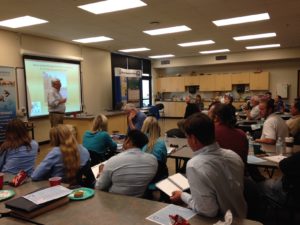
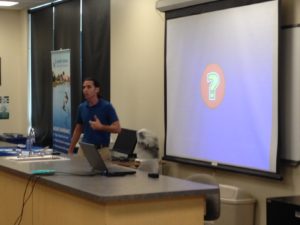
11:00 AM Welcome and Introductions
John Walkinshaw, President, Florida Lake Management Society
Robert Burnes, Pinellas County Watershed Management
11:10 AM A preliminary assessment of the ability of barley straw, cypress leaves and L-lysine to inhibit cyanobacteria in Lake Hancock, a hypereutrophic lake in Central Florida – Click here to email Dave Tomasko, ESA Associates
11:30 AM Phosphorus, Nitrogen and Chlorophyll A in Selected Storm Water Ponds Relative to the 2008 Fertilizer Ordinance in Lee County, FL. – Click here to email Dr. Ernesto Lasso de la Vega, Lee County Hyacinth Control District
11:50 AM Effecting Environmental Change—the misnomer of “soft BMPs” – Click here to email John McGee, Hillsborough County
12:10 PM Lunch Break – Sponsored by Aquatic Systems
12:40 PM The Impacts of Reuse in the Urban Environment– Click here to email Dr. Harvey Harper, Environmental Research & Design, Inc.
1:00 PM Water quality management plan development for priority lakes in Polk County – Click here to email Hans Zarbock, P.E., Polk County
1:20 PM Rapid Assessment of Submerged Aquatic Vegetation Communities on a Large 2,500 Acre Lake in West-Central Florida – Click here to email David Eilers, UCF Water Institute
1:40 PM Break
2:00 PM Freshwater Clams for Micro-Filtering Stormwater Retention Ponds – Click here to email Ernie Franke, The Shore of Long Bayou Condominiums & Ryan Sullivan, Gulf Coast Lakes and Wetlands
2:20 PM Hillsborough River Watershed Alliance – Click here to email John Walkinshaw, HRWA
2:40PM Roundtable Discussion & Wrap Up
Maryann Krisovitch, Florida Lake Management Society
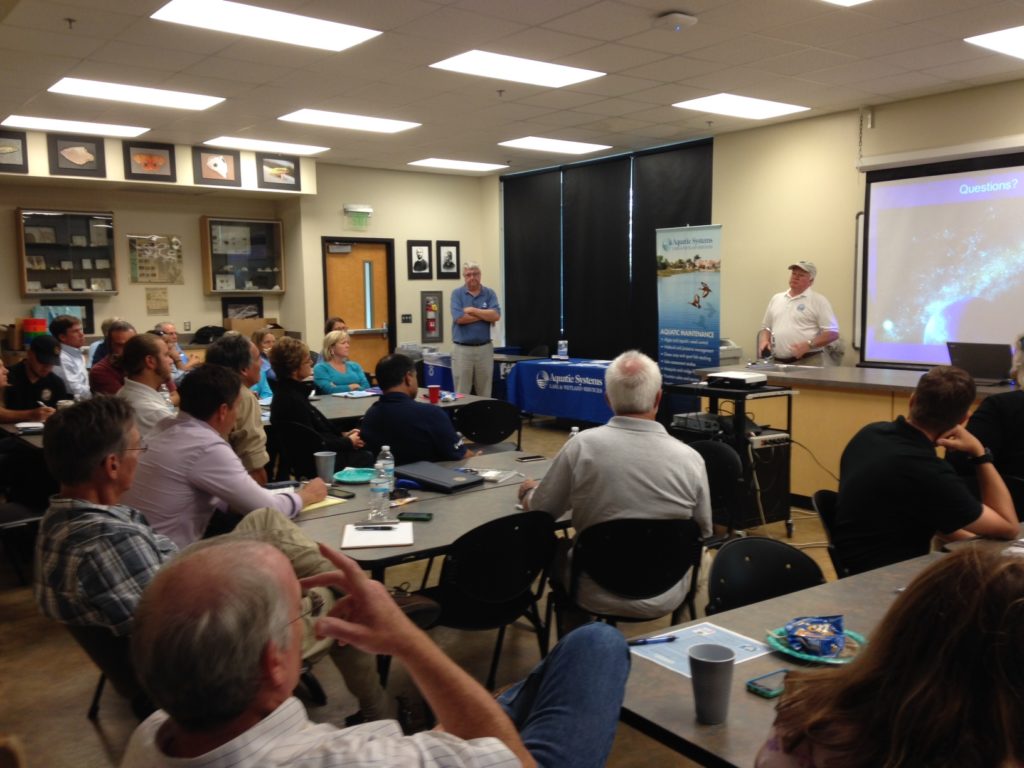
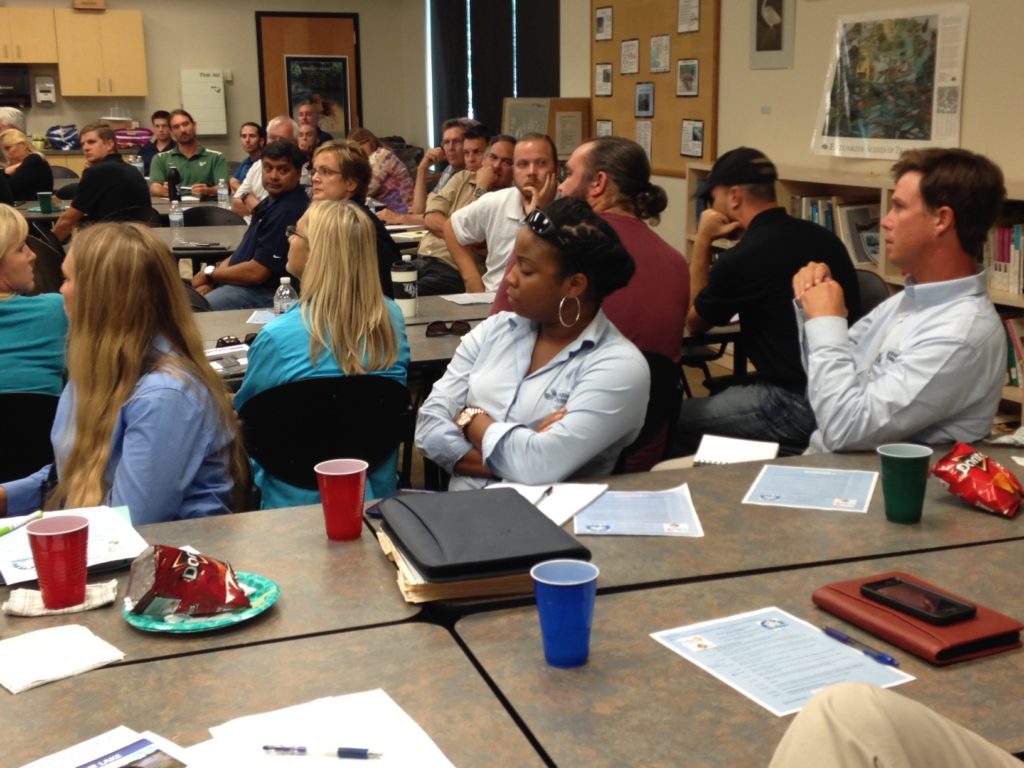

You must be logged in to post a comment.